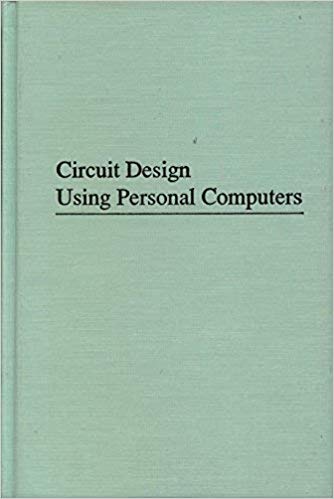
|
FreeComputerBooks.com
Links to Free Computer, Mathematics, Technical Books all over the World
|
|
- Title: Circuit Design Using Personal Computers
- Author(s) Thomas R. Cuthbert
- Publisher: Krieger Pub Co (February 1994)
- Hardcover/Paperback: 494 pages
- eBook: PDF (509 pages, 12 MB)
- Language: English
- ISBN-10: 0894646370
- ISBN-13: 978-0894646379
- Share This:

|
This practical guide to designing electronic circuits using small computers and programmable calculators makes it easy to implement both classical and sophisticated design techniques. It uses the interaction between circuit designer and computer to clarify both design techniques and fundamental concepts. It also shows how to produce useful answers quickly, while developing a feel (or the procedure and obtaining insight into fundamental processes - such as the errors between exact derivatives and their finite-difference estimates.
This book is intended for practicing electrical engineers and for university students with at least senior-class standing. Its topics will also interest electronics engineers. who design circuits derived in terms of complex variables and functions, to provide impedance matching. filtering. and linear amplification. Circuits operating from very low frequencies all the way through millimeter waves can be designed by these techniques. The necessary numerical methods will also be of interest to readers who do not have specific applications.
About the Authors- N/A
- Electronic Engineering
- Electronics Circuit Design and Programming
- VHDL (VHSIC Hardware Description Language)
- Computer Hardware and Personal Computers (PC)
 Similar Books:
Similar Books:
-
 Designing Analog Chips (Hans Camenzind)
Designing Analog Chips (Hans Camenzind)
A comprehensive introduction to CMOS and bipolar analog IC design. The book presumes no prior knowledge of linear design, making it comprehensible to engineers with a non-analog background.
-
 Application-Specific Integrated Circuits (Michael J. Smith)
Application-Specific Integrated Circuits (Michael J. Smith)
This comprehensive book on application-specific integrated circuits (ASICs) describes the latest methods in VLSI-systems design. It covers both semicustom and programmable ASIC types.
-
 Flexible Circuit Technology (Joseph Fjelstad)
Flexible Circuit Technology (Joseph Fjelstad)
This book was written to provide a bridge of understanding by offering a clearly defined set of steps which take the reader from basic concepts of flexible circuits to a more detailed review of the various technology and materials.
-
 Lessons in Electric Circuits (Tony R. Kuphaldt)
Lessons in Electric Circuits (Tony R. Kuphaldt)
A 6 volumes series of textbooks on the subjects of electricity and electronics. This book was written to be a good enough book without delving too heavy on the math, while still maintaining a lot of important information.
-
 DC Electrical Circuit Analysis: A Practical Approach (James Fiore)
DC Electrical Circuit Analysis: A Practical Approach (James Fiore)
Basic concepts are introduced such as charge, current, energy, power and voltage. Covering analysis techniques such as superposition, source conversions, mesh analysis, nodal analysis, , Thévenin's and Norton's theorems, and delta-wye conversions, etc.
-
 AC Electrical Circuit Analysis: A Practical Approach (James Fiore)
AC Electrical Circuit Analysis: A Practical Approach (James Fiore)
Cover topics including series, parallel, and series-parallel RLC circuits. Numerous theorems and analysis techniques are examined including superposition, Thévenin's theorem, nodal and mesh analysis, maximum power transfer and more.
-
 Circuit Theory (WikiBooks)
Circuit Theory (WikiBooks)
The aim of this book is to assist students in understanding the basic concepts of circuit theory and developing the fundamental tools of linear circuit analysis, which will be useful for all engineers.
-
 AC Circuits (Chad Davis)
AC Circuits (Chad Davis)
This book covers Alternating Current (AC) circuit theory as well us a brief introduction of electronics. It covers the basic theory of AC signals, sinusoidal waveforms, square waves, triangle waves, the mathematics background, resistors, inductors, and capacitors.
-
 DC Circuits (Chad Davis)
DC Circuits (Chad Davis)
This book covers Direct Current (DC) circuit theory: The basics for circuits that include DC sources (voltage or current) and resistors; Problem solving techniques for circuits that include only DC sources and resistors; Capacitors and inductors.





